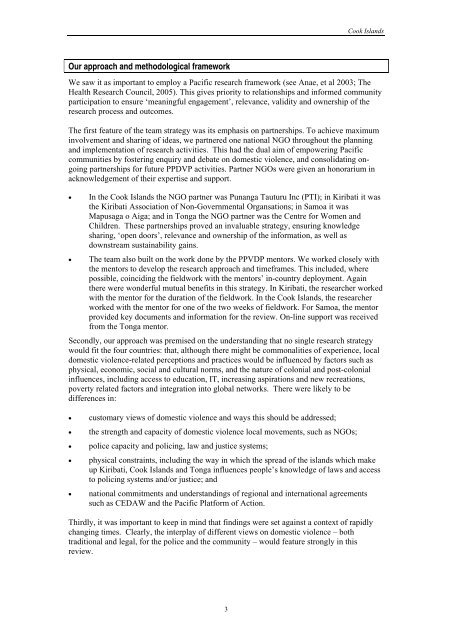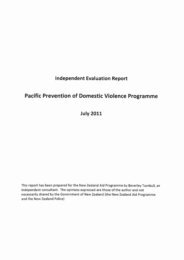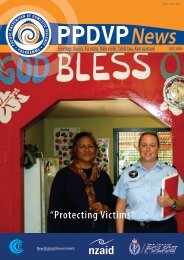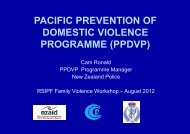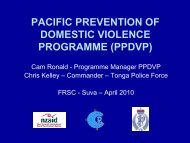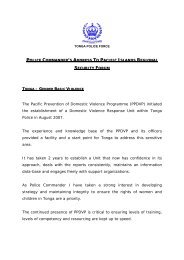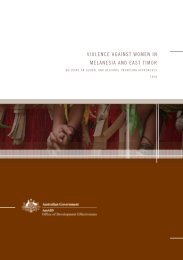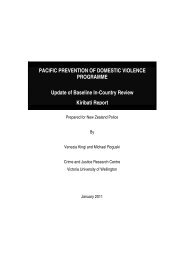Cook Islands - Pacific Prevention of Domestic Violence Programme
Cook Islands - Pacific Prevention of Domestic Violence Programme
Cook Islands - Pacific Prevention of Domestic Violence Programme
Create successful ePaper yourself
Turn your PDF publications into a flip-book with our unique Google optimized e-Paper software.
<strong>Cook</strong> <strong>Islands</strong><br />
Our approach and methodological framework<br />
We saw it as important to employ a <strong>Pacific</strong> research framework (see Anae, et al 2003; The<br />
Health Research Council, 2005). This gives priority to relationships and informed community<br />
participation to ensure ‘meaningful engagement’, relevance, validity and ownership <strong>of</strong> the<br />
research process and outcomes.<br />
The first feature <strong>of</strong> the team strategy was its emphasis on partnerships. To achieve maximum<br />
involvement and sharing <strong>of</strong> ideas, we partnered one national NGO throughout the planning<br />
and implementation <strong>of</strong> research activities. This had the dual aim <strong>of</strong> empowering <strong>Pacific</strong><br />
communities by fostering enquiry and debate on domestic violence, and consolidating ongoing<br />
partnerships for future PPDVP activities. Partner NGOs were given an honorarium in<br />
acknowledgement <strong>of</strong> their expertise and support.<br />
• In the <strong>Cook</strong> <strong>Islands</strong> the NGO partner was Punanga Tauturu Inc (PTI); in Kiribati it was<br />
the Kiribati Association <strong>of</strong> Non-Governmental Organsations; in Samoa it was<br />
Mapusaga o Aiga; and in Tonga the NGO partner was the Centre for Women and<br />
Children. These partnerships proved an invaluable strategy, ensuring knowledge<br />
sharing, ‘open doors’, relevance and ownership <strong>of</strong> the information, as well as<br />
downstream sustainability gains.<br />
• The team also built on the work done by the PPVDP mentors. We worked closely with<br />
the mentors to develop the research approach and timeframes. This included, where<br />
possible, coinciding the fieldwork with the mentors’ in-country deployment. Again<br />
there were wonderful mutual benefits in this strategy. In Kiribati, the researcher worked<br />
with the mentor for the duration <strong>of</strong> the fieldwork. In the <strong>Cook</strong> <strong>Islands</strong>, the researcher<br />
worked with the mentor for one <strong>of</strong> the two weeks <strong>of</strong> fieldwork. For Samoa, the mentor<br />
provided key documents and information for the review. On-line support was received<br />
from the Tonga mentor.<br />
Secondly, our approach was premised on the understanding that no single research strategy<br />
would fit the four countries: that, although there might be commonalities <strong>of</strong> experience, local<br />
domestic violence-related perceptions and practices would be influenced by factors such as<br />
physical, economic, social and cultural norms, and the nature <strong>of</strong> colonial and post-colonial<br />
influences, including access to education, IT, increasing aspirations and new recreations,<br />
poverty related factors and integration into global networks. There were likely to be<br />
differences in:<br />
• customary views <strong>of</strong> domestic violence and ways this should be addressed;<br />
• the strength and capacity <strong>of</strong> domestic violence local movements, such as NGOs;<br />
• police capacity and policing, law and justice systems;<br />
• physical constraints, including the way in which the spread <strong>of</strong> the islands which make<br />
up Kiribati, <strong>Cook</strong> <strong>Islands</strong> and Tonga influences people’s knowledge <strong>of</strong> laws and access<br />
to policing systems and/or justice; and<br />
• national commitments and understandings <strong>of</strong> regional and international agreements<br />
such as CEDAW and the <strong>Pacific</strong> Platform <strong>of</strong> Action.<br />
Thirdly, it was important to keep in mind that findings were set against a context <strong>of</strong> rapidly<br />
changing times. Clearly, the interplay <strong>of</strong> different views on domestic violence – both<br />
traditional and legal, for the police and the community – would feature strongly in this<br />
review.<br />
3


